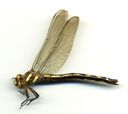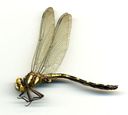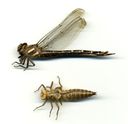Cordulegaster
Cordulegaster
Classification
- Phylum: Arthropoda
- Subphylum: Hexapoda
- Class: Insecta
- Order: Odonata
- Suborder: Anisoptera
- Family: Cordulegastridae
- Genus: Cordulegaster
Pronunciation
How to pronounce Cordulegaster: /ˌkɔr.djuː.ləˈɡæs.tər/
These audio files are automatically generated. While they are not always 100% accurate, they are a good starting point.
Images






Summary
Cordulegaster is a genus of dragonflies in the family Cordulegastridae, encompassing various species notable for their aquatic larval stage and predatory adults, characterized by their long ovipositor in females.
Physical Characteristics
Females of the genus are known for their long ovipositor, which has led to the common name associated with them.
Identification Tips
Look for distinct species characteristics in coloration and markings; many species have notable features such as spots or unique body shapes.
Habitat
Cordulegaster species are typically found in habitats near waterways, such as rivers and streams, which provide essential breeding grounds.
Distribution
There are 8 identified species of Cordulegaster, distributed primarily across various regions, including North America, Europe, and parts of Asia.
Diet
As adults, they primarily feed on smaller insects, utilizing their predatory skills as they catch prey in flight.
Life Cycle
Like other dragonflies, the life cycle includes the egg, nymph (aquatic larval stage), and adult stages. Nymphs are aquatic and can live for several years before emerging as adults.
Reproduction
Females lay eggs in or near water bodies, often utilizing their long ovipositor to deposit eggs directly into suitable substrates.
Predators
Natural predators include birds, larger insects, and other arachnids that feed on flying insects.
Ecosystem Role
They play a vital role as both predator and prey, helping to control insect populations and serving as food for other wildlife.
Collecting Methods
- Net capture during flight
- Attraction to light traps
Preservation Methods
- Drying
- Mounting on pins for display
Evolution
Cordulegaster most likely evolved during the Triassic period, indicating a long history as part of the Odonata order.
Similar Taxa
Misconceptions
Some people may confuse Cordulegaster species with other similar-looking dragonflies, such as those in the Aeshnidae family.
Tags
- dragonfly
- Cordulegaster
- odonata
- insecta
- predatory insects